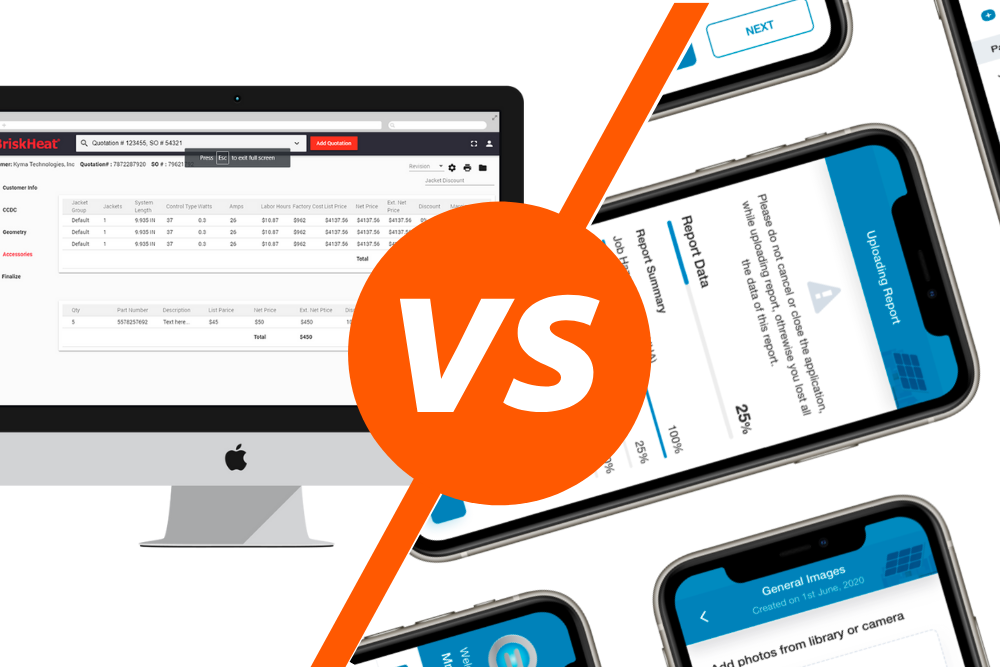The Pros and Cons of Native Apps and Web Apps
There is a common misconception that mobile apps and web apps are the same things. But in reality, the two are very different, and deciding between the two can be tricky! You must consider features, functionality, and, of course, cost. Additionally, the differences in their user experience and development process are important to consider. In this article, you’ll learn what the web app vs. mobile app development debate is all about, the strengths and weaknesses of the two software solutions, and tips on how to make your decision. Let’s get started!
Web Apps vs. Mobile App Developments – What’s the Difference?
Though websites and mobile app developments look and even act similarly, the two are very different. To fully understand the web app vs. mobile app development rival, you must comprehend the dichotomies between the technologies:
Web Apps
A web app is a website that is designed fluidly and optimized for smartphone viewing. They adapt to whichever device they’re being viewed on: computer, tablet, or cell phone. They do not need to be downloaded or installed.
Mobile Apps
Mobile apps, also called native apps, are designed for specific mobile platforms: iOS or Android. They are downloaded—some for free, others for a fee—and installed on a smartphone. Mobile apps can also access phone functions like camera, microphone, or even GPS.
Web Apps vs. Mobile App Developments – Pros and Cons
Deciding between a web app and mobile app development presents pros and cons to both the business and its users. Each must be weighed in terms of importance before making the decision. Below is a list of pros and cons for both mobile apps and web apps:
Mobile App Pros
- Faster than web apps
- More responsive than web apps
- Can work offline
- Leverage device capabilities like camera, GPS, microphone
- More secure than web app
Mobile App Cons
- More expensive to build than web apps
- Compatibility with different platforms (i.e. iOS and Android) can mean designing and coding two different apps from scratch
- Require periodic updates
- Must get approval from app store before product can go live
Web App Pros
- Do not need to be downloaded or installed
- No need to update
- Cheaper than mobile app
- Quicker and easier to build than mobile apps
- Can be accessed from any mobile device regardless of the operating system
Web App Cons
- Do not work offline
- Slower than mobile apps
- Less advanced in terms of features and functionality
- Without approval from app stores, quality and security is not always guaranteed
When to Build a Web App
Before you build a web app, you must make sure a few things apply to your organization and target audience. If a web page layout provides a better interface for your application, your target market prefers browsers over mobile devices, and your development budget is limited, then building a web app may be in your best interest. Popular web apps include Google Analytics and Microsoft 365.
When to Build a Native Mobile App
On the other hand, if your app requires access to a user’s camera or contact list, your customers are avid mobile users, and your projected profit exceeds development cost, mobile app development may be your best bet. SnapChat and WhatsApp are two of the most highly-adopted mobile apps on the market; each utilizing a specific internal function of a mobile device (Snapchat uses camera, WhatsApp uses contacts list).
Web App vs. Mobile App Development – The Choice Is Yours
People are bound to argue web app vs. mobile app development for years to come. But now that you’ve got a better idea of differences between web apps and mobile app developments, it’s time to make your decision. Rest assured that while drawbacks are present, each option presents a unique set of advantages that can improve your organization. No matter which you choose, simply adding a custom application to your business offerings is a giant leap in the right direction. Best of luck on your development journey!
Get a FREE quote on your project today!
Your idea is 100% protected by our Non-Disclosure Agreement
Related Posts
Databricks vs Snowflake vs Redshift
The workload type, financial concerns, and business use case all play a role in selecting Databricks, Snowflake, and Redshift as your cloud…
Agentic AI: Your Autonomous Ally
While traditional AI tools provide recommendations or analyze data, Agentic AI goes a step further, autonomously managing complex…
You might also like
Stay ahead in tech with Sunflower Lab’s curated blogs, sorted by technology type. From AI to Digital Products, explore cutting-edge developments in our insightful, categorized collection. Dive in and stay informed about the ever-evolving digital landscape with Sunflower Lab.








